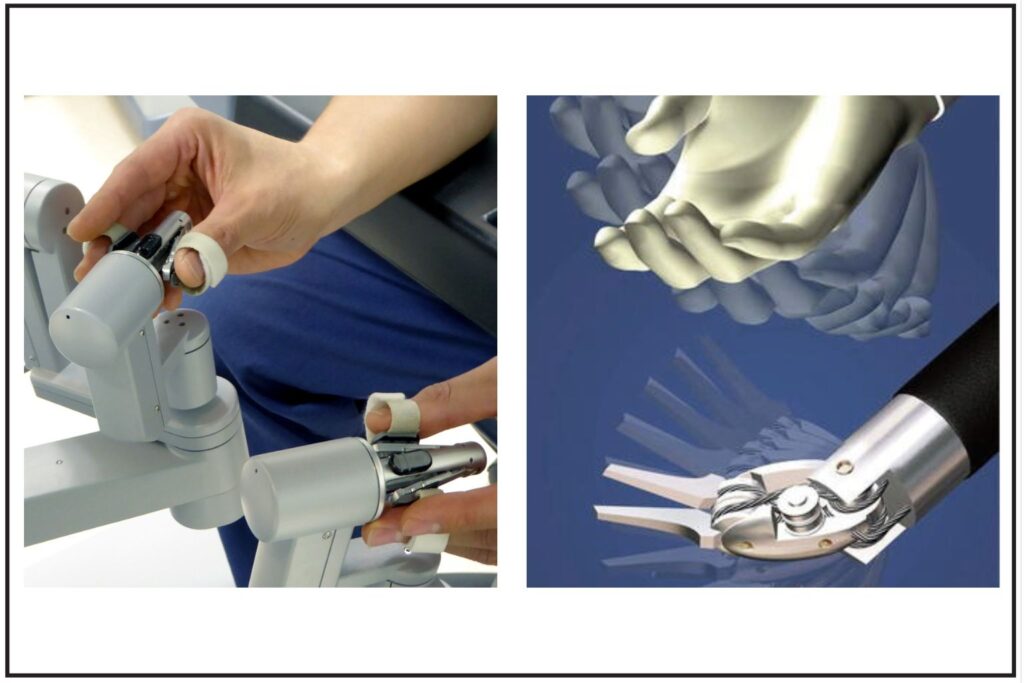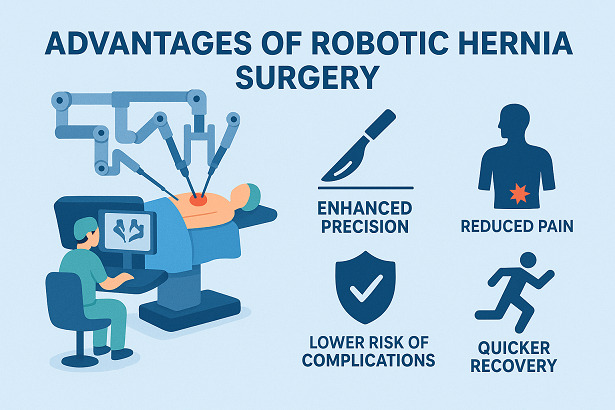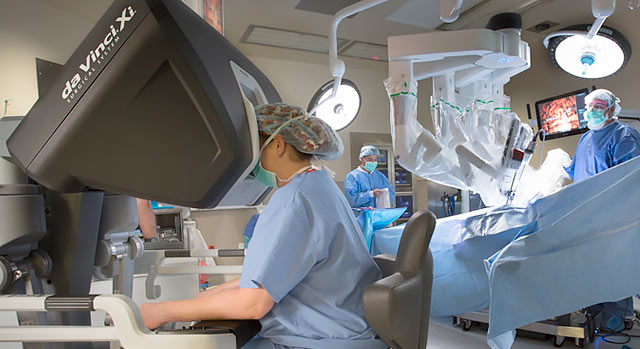
Table of Content:
Robotic surgery, also known as robot-assisted surgery, is a form of minimally invasive surgery performed through small incisions, similar to laparoscopic surgery. In traditional laparoscopic procedures, the surgeon operates while standing beside the patient, manually handling the instruments. In contrast, robot-assisted surgery involves docking a surgical robot next to the patient, with robotic instruments attached to its arms. An assistant surgeon and an OT nursing assistant remain at the patient’s side to support the procedure. Meanwhile, the primary surgeon sits at a console within the operating theater, controlling the robot’s arms remotely with high accuracy. This advanced technique is increasingly being adopted for procedures such as robotic hernia surgery in Ahmedabad, offering improved accuracy and better patient results.
Both Robotic and laparoscopic surgery are minimally invasive surgery. They are done by making small holes of about 5, 8, 10, and 12 mm, depending on the type of surgery. Thin and long instruments go inside your tummy through these cuts, and the surgery is performed with the help of these instruments. Carbon dioxide gas is inserted into the tummy to make space for performing surgery in both types of surgery. Hence, both laparoscopic and robotic surgery give the advantages of minimally invasive surgery, like less pain, smaller cuts (preventing future hernia problems), less blood loss, and faster recovery.
Robotic instruments are much more sophisticated than laparoscopic instruments. This helps in making many difficult steps become simple, allowing better execution and thus improving the overall outcome. The Robotic arms are much more sturdy and stable, which again provides for minimizing minor errors and improving the execution of surgical steps.

The robotic instruments have a wider range of motion compared to standard laparoscopic tools, facilitating complex repairs and meticulous tissue handling. This makes many surgical steps much easier to perform. Eventually, some complex and difficult surgeries that are not possible or very difficult by laparoscopy become comfortably possible with robotic instruments. Also, the robot arms are sturdy and stable, reducing the strain and fatigue on the surgeon’s arms, making it possible for the surgeon to execute the surgery with more ease, precision, and finesse.
However, an experienced and skillful laparoscopic surgeon can, in today’s time, perform even advanced and complex surgeries with excellent results, even without a robot. They know the tricks to achieve the desired outcome even with the laparoscopic instruments, which have a limited range of movement. But when available and cost is not a concern, the same surgeon does even better with the help of robotic instruments.
The robotic system offers high-definition, three-dimensional visualization of the surgical field, improving depth perception and accuracy during the procedure. Although the current and updated laparoscopic systems have equally good vision, vision is not a great advantage if we compare it with the newer, more updated laparoscopic system. We use the latest Storz Rubina 4K laparoscopic system, which gives equally good vision, making it possible for us to perform the surgery with better precision, even while doing laparoscopic surgery.

Robotic hernia surgery offers several advantages over traditional laparoscopic hernia surgery.

Robotic surgery is generally costly in today’s time. This is because of the cost of each instrument, which is charged for each single use of each instrument. Robot instruments are costly and can be used only a specific number of times, thus costing immensely. Apart from this, the robot itself is very expensive, costing the hospital. Therefore, robot-assisted surgery would cost roughly 1-1.5 lacs more than laparoscopic hernia surgery. Hence, a robotic hernia surgery would cost between 2-4 lac rupees, depending on the type of surgery, mesh, robotic instrument, and room category.
The best decision for your hernia would depend on many factors, including the type of your hernia, your age and medical problems, your work profile, insurance, and cost considerations. An experienced hernia specialist can help you in making this decision. Finally, whether robotic or laparoscopic, the overall outcome of your surgery would depend on the expertise and skill of the hernia surgeon. But a good surgeon would guide you on whether the added cost of a robot is justified in your case or not. If cost is not a problem, then certainly, robot-assisted surgery would have additional advantages. But again, as I mentioned before, for the majority of hernias, if the cost of a robot is something that you cannot afford, then an expert hernia surgeon can give you equally good outcomes with laparoscopic surgery.
Choosing the right type of hernia surgery, whether robotic or laparoscopic, depends on your health needs, costs, and your surgeon’s skills. Adroit Centre provides personalized care and support. Dr. Chirag Thakkar is one of the top robotic hernia surgeons in Ahmedabad, Gujarat, India. He can help you make the best choice for your health.
If you’re seeking the best hernia doctor in Ahmedabad, look for a specialist who combines medical expertise with a patient-first approach. Your path to recovery starts with understanding your options and working with a trusted medical professional. Get in touch with us. You can book a video consultation with Dr Chirag Thakkar. Call on +91-8156078064 to fix an appointment.
Please subscribe to our YouTube channel to stay connected. Dr Chirag Thakkar is a gastrointestinal surgeon. He has been carrying out gastro intestinal and weight loss surgery for the past 18 years. Surgery for GERD, hiatus hernia and Obesity are his core areas of interest and expertise. At ADROIT, we don’t just repair your hernia, but aim at restoring the patient’s best possible activity level after surgery and giving our patients a very smooth and comfortable surgery experience.

Dr Chirag Thakkar
Senior Gastrointestinal and Bariatric Surgeon
GERD and Esophageal Motility Expert
Hernia Surgery Specialist
Founder Director of ADROIT Centre for Digestive and Obesity Surgery